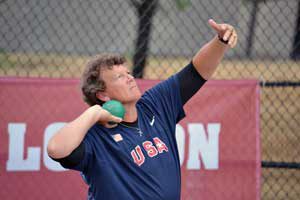DAV member overcomes obstacles, achieves lifelong dream

“It took three months to lose everything—three months to zero,” Angela Madsen said of the surgery that left her paralyzed in 1993.
Once a promising athlete, the Marine Corps veteran was no stranger to hardships. However, after being injured in service and undergoing a debilitating operation, she found herself starting from square one—homeless, jobless and in a desperate struggle to regain meaning in her life.
Through strength and determination, Madsen fought her way out of darkness and went on to discover a new purpose and a way to once again proudly represent her country—this time as a Paralympian.
“I have been athletic all of my life,” Madsen said. “I was raised with four athletic brothers, so I never sat on the sidelines. I was always the first pick for teams—not the first girl picked, the first picked—because nobody wanted the other team to pick me.”
Madsen dreamed of competing in the Olympics. However, life interrupted when she became pregnant at 17. The young mother came up with a new plan and joined the Marine Corps.
During the second year of her enlistment, Madsen found the door to competitive athletics once again opened to her as she was recruited to play for the All-Marine basketball team. But an injury during practice soon dashed her dreams again. Madsen fell and another player landed on her lower back, rupturing two disks and ending her military career.
“When I was selected to play ball for the USMC, my Olympic dream was back on,” Madsen said. “I could be a Marine, a single parent and play sports at an elite level. But when I got injured, I was devastated.”
After being discharged, she found work as an auto mechanic and a computer-aided drafter in mechanical engineering. By 1993, Madsen had a promising job lined up as an engineer and competed in recreational sports. However, her physical condition was deteriorating.
The two ruptured disks from her back injury were collapsing on her nerve root, causing the beginning of paralysis. She was forced to take time off work to get much-needed back surgery. In another unexpected turn, doctors accidentally drilled through Madsen’s spinal cord, leaving her paralyzed and in a wheelchair.
“Life as I knew it was over,” Madsen said. Not only was she adapting to new physical limitations, she lost her job and her personal relationships began to crumble. Adding insult to injury, she found herself homeless, evicted from her home upon her discharge from the hospital.
“Everything that I had worked for or hoped for was gone, and I was alone,” said Madsen. “I was fighting a battle I was not trained for. I was not thinking about sports. I was just trying to survive on the streets being newly post-op and new to wheelchair life.”
Madsen had been trying to file for her veterans benefits when she joined DAV Chapter 19 in Lakewood, Calif. She was connected with a service officer to represent her claim. After appealing her initial 10 percent disability rating, DAV helped gain Madsen an appropriate rating for her level of disability.
“I was finally done fighting and had won the war,” Madsen said.
With her VA benefits settled, Madsen decided to return to sports. Her hope was to regain confidence by attending the National Veterans Wheelchair Games put on by the Paralyzed Veterans of America (PVA) and the Department of Veterans Affairs in 1995.
“Before that I had been considering suicide,” Madsen said. “I was ready to end it, but that was the first time I had returned to any type of sports, and it made all the difference.”
Madsen began adaptive rowing in 1998, and by 2000 she qualified for the U.S. national adaptive rowing team. She won gold medals in four consecutive world championships from 2003 to 2006. In 2008, Madsen’s Olympic dreams were realized as she earned a spot on Team USA to participate in the inaugural adaptive rowing event at the Beijing Paralympics.
“I have gone through so much and worked so hard to get here,” Madsen said. “Putting on the uniform and representing our country at the highest level of sports is like gaining redemption of my birthright and fulfilling my destiny.”
In 2012, she competed at the London Paralympic Games and won the bronze medal in shot put. And this year, Madsen—now 57 and a grandmother of five—was one of 34 military veterans who participated in the Paralympic Games in Rio—placing seventh in women’s javelin and eighth in women’s shot put.
“We couldn’t be more proud to count Angela among our members,” said DAV National Membership Director Doug Wells. “I’m glad DAV could be there at her time of need. She is the epitome of a fighter, and her story proves how much veterans can accomplish when you pair the right attitude with the right resources.”
“Getting blown off course in ocean rowing is like life, you can remain adrift and lost or you can decide where you want to go and plot a new course,” said Madsen. “We are never truly powerless as long as we can choose to move forward in a positive manner. Three months to zero has become all of this and the best is yet to come.”



